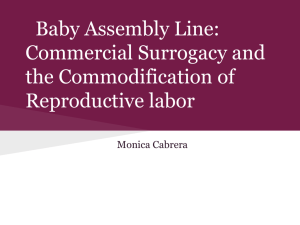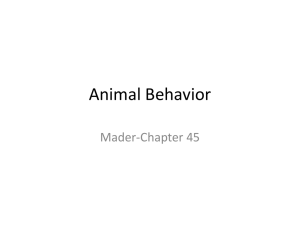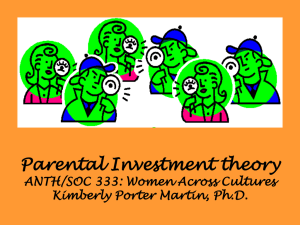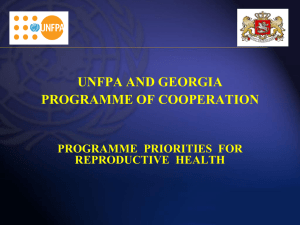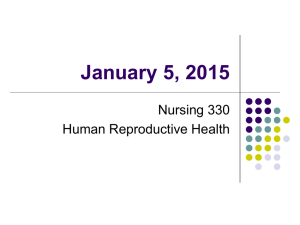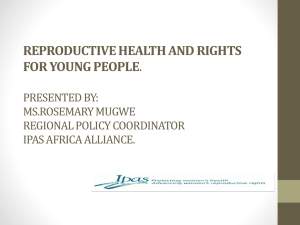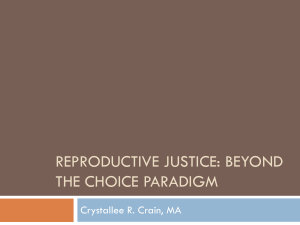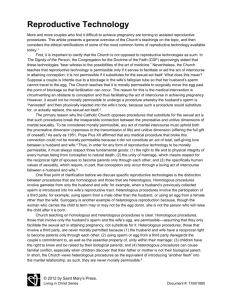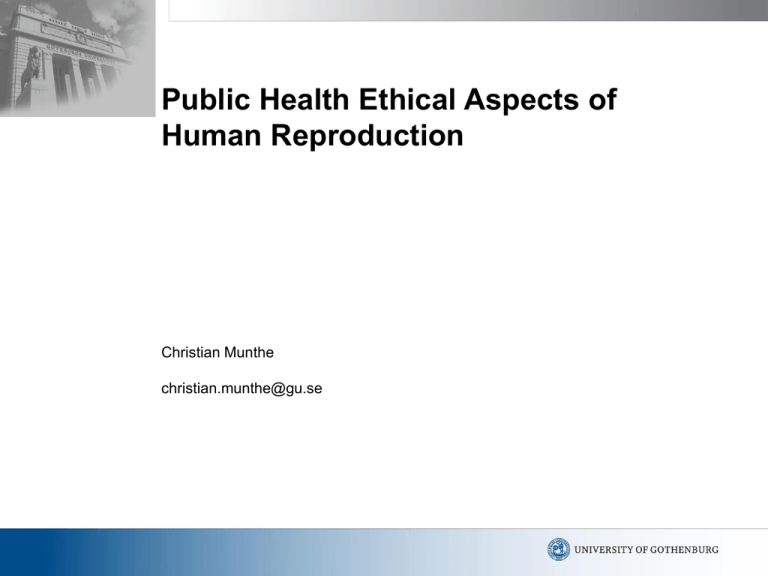
Public Health Ethical Aspects of
Human Reproduction
Christian Munthe
christian.munthe@gu.se
PH Ethics vs. HC Ethics
HC Ethics
PH Ethics
OBJECT
OBJECT
HC staff
patient
ISSUE 1
ISSUE 1
Right? / Wrong?
Right? / Wrong?
population
ISSUE 2
health
institutions
society
society
What policy /
regulation of
object?
ISSUE 2
What
policy /
regulation
of
object?
Consequences
•
•
•
•
•
•
•
•
•
Goals and restrictions of PHE are not about individual health states and
means for attaining these used by individual agents
Not as evident as in HCE that individual rights have foundational priority
Respect for autonomy (of the person) less obvious as a default restriction
PHE in a sense “prior to” HCE
Population health (basic societal concern)
Health equality (outcomes and/or opportunities)
Cost-effectiveness
Moderation to guard against counter-productivity (e.g. preservation of
trust in PH institutions)
Moderation to guard against inter-sectorial dysfunction (criminal law,
economy, stability, peace…)
Reproduction and Public Health
•
•
•
•
•
•
•
•
The size, composition and functionality of the population have a major
impact on population health and other central societal concerns
Longstanding societal interest in controlling sexuality, reproduction and
child rearing + the family as a basic societal building block
Infanticide, geronticide, eugenics, family & sexual policy/morality, prestate customs re. power allocation and structures of reproductive
collective units (the family), e.g. the patriarchal model
Modern times: maternal and infant mortality, STD, contraceptives,
abortion, prenatal testing, IVF + social security and uniform education
systems supporting desired reproductive patterns.
Misconceptions: sterilization policies, Ceausescu abortion policy
Concern for individual reproductive rights and autonomy follow PH
increases, rather than causes them?
China 1 child policy – a necessary complement?
Evironmental problems may impose new limits…
PHE literature on reproduction
•
State responsibilities re. sexual health (HIV/AIDS in Africa)
Dickens & Cook (2007)
•
Effects of IVF on population health: reason for regulation
Clemmit (2009)
•
Family planning education for the sake of promoting individual autonomy
Hale & Hale (2010)
PROBLEMS:
• “sex is overrated” + healthy children of infected mothers as a PH resource
• Individual autonomy promotion not an obvious concern in PHE
• PHE concerns on IVF seem to go against the default reproductive liberty
view developed in HCE
•
General: unsystematic PHE framing & uncritical consideration of potential
conflicts between PHE, HCE and other ethics concerns
Examples & questions
•
Restricting reproductive liberty due to PH reasons 1
–
–
–
–
–
–
•
Restricting reproductive liberty due to PH reasons 2
–
–
–
–
•
All individual liberty restrictions may not be possible to justify with the harm-to-others clause
Accommodation of climate refugees may create a need for reduced nativity
Reducing nativity to enable maintained material standard in environmental crisis
PH reasons to control and regulate the IVF and genetic testing industry (avoiding the “picking
up the pieces” effect)
Crippling the private HC sector (IVF, PND, PGD, et cetera) with taxation to fund reduction of
health inequalities
Containment of PH emergencies structurally restricting individual reproductive choice
Promoting nativity to boost growth in developing countries
Restricting nativity DITTO (possibly in environmental problem context)
Eugenics / reproductive control DITTO (but is it a good way? Cf. sterilization….)
Controlling reproductive behaviour as a means to social stability (does it work?)
What is reproductive population health and how important is it?
–
–
–
–
Right into the Parfit – Arrhenius mess?
Can reproductive liberty be somehow given a role in the goals of reproductive PH?
Equality of reproductive opportunities once a basic PH level is secured?
Implications for sexual freedom…


